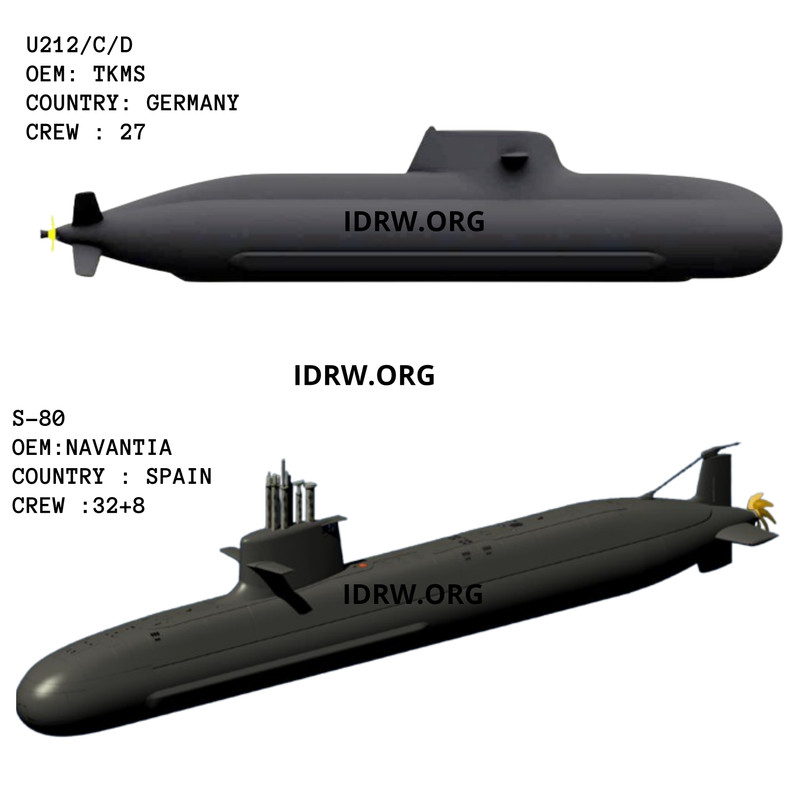SOURCE: RAUNAK KUNDE / NEWS BEAT / IDRW.ORG


The competition for India’s prestigious P-75(I) submarine tender has taken an unexpected turn, with Spain’s Navantia challenging the leading position of ThyssenKrupp Marine Systems (TKMS) of Germany. Navantia has urged the Indian Ministry of Defence (MoD) to decide the winner of the contract based on a price discovery method, rather than relying on the results of the Air Independent Propulsion (AIP) system field evaluation trials (FET). This move could significantly impact the outcome of the tender for six submarines, a contract that is crucial for modernizing the Indian Navy’s underwater fleet.
Price discovery is a method where the market price of an asset is determined through the interaction of buyers and sellers. Navantia’s call for the Indian MoD to prioritize pricing in the decision-making process reflects a belief that they can offer the S-80 Plus submarines at a more competitive cost compared to TKMS. While this could be advantageous for India from a financial perspective, it diverts attention from the technical evaluations, especially the critical AIP systems that would provide submarines with enhanced endurance and stealth capabilities underwater.
The Indian Navy has conducted rigorous evaluations of the AIP systems offered by both companies, which revealed some concerns. Navantia demonstrated its Bio Ethanol Stealth Technology (BEST) AIP system, but this was only based on a land-based prototype. The proposed AIP system would only be integrated into their submarines starting with the third vessel, which is expected no earlier than 2028. The Indian Navy has raised concerns about this delay, as they were hoping for a more mature, sea-proven solution.
On the other hand, TKMS presented an AIP system that is already operational in their submarines. However, the system offered for the P-75(I) tender has not yet been tested with the power generation requirements specified by the Indian Navy. While TKMS has operational experience with its AIP technology, the specific variant under consideration for India lacks the exact trial results requested during evaluations.
Previously, it was reported that the Indian Navy was leaning towards the TKMS offer, largely due to the company’s experience in delivering functional AIP systems on existing submarines. However, idrw.org has indicated that the submarines offered by TKMS might be significantly more expensive than those from Navantia. Navantia’s push for a price-based decision seems to exploit this, making cost efficiency a priority over technical maturity.
Both companies have failed to showcase fully proven AIP systems on submarines, as required by the tender. Navantia’s AIP system is still in its early stages of integration on actual submarines, while TKMS’s offer is yet to meet the Indian Navy’s exact specifications. This has left the door open for other contenders, including Russia and France, to step into the competition.
Russia, which had initially opted out of the P-75(I) tender due to the lack of a proven AIP system, has recently offered its Amur 1650 submarine equipped with a developed AIP system. Meanwhile, France, which has been collaborating with India’s Defence Research and Development Organisation (DRDO) on integrating a Fuel-Cell-based AIP system for the existing Kalvari-class submarines, has extended its offer to help India develop a new submarine if required. This development adds another layer of complexity to the already competitive tender process.
The P-75(I) tender has become a multi-faceted contest involving not only performance evaluations but also financial considerations. Navantia’s push for a price-based decision could sway the Indian MoD if cost becomes a critical factor. However, the Indian Navy’s priority remains a proven and reliable AIP system, which might give TKMS the upper hand despite the potential cost disparity. With Russia and France now offering alternatives, India unlikely will allow them to come back in the tender process at such advacne stage .
NOTE : Article cannot be reproduced without written permission of idrw.org in any form even for YouTube Videos to avoid Copy right strikes. Websites doing illegal reproductions will get DMCA and Legal Notices.